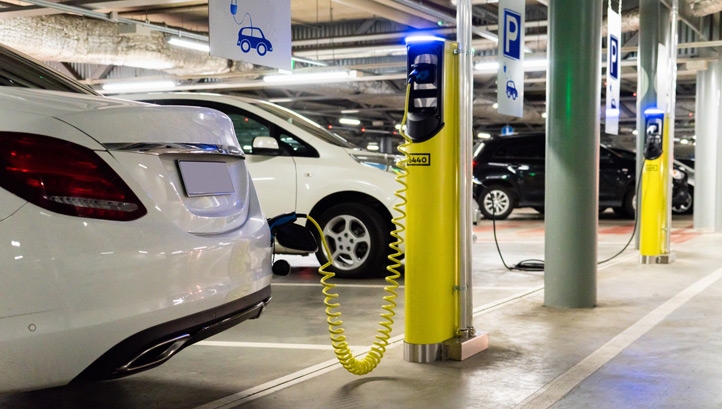The number of public charging stations for electric vehicles (EVs) in the UK has surpassed the number of petrol stations for the first time.

The UK’s EV market grew by a record-breaking 19% in 2018
Data from charging firm Zap-Map has found that there are now 13,688 public charging devices located across 8,546 locations – surpassing the 8,400 petrol stations found in the UK.
The data highlights the ongoing transition towards EVs in the UK, which is being spurred by infrastructure development, technology advancements and policy drivers. In 2000 there were more than 13,100 petrol station sites. In contrast, Zap-Map data suggests that there were around 1,500 public chargers in 2011.
Zap-Map’s co-founder Ben Lane said: “The public and private sectors are now investing heavily in the UK’s EV charging infrastructure to ensure that there are sufficient charging points to support the growing electric fleet.
“This month’s milestone reveals the rapid pace of change already underway as the age of the combustion engine gives way to an all-electric era with vehicles offering both zero-emissions and a better driving experience.”
The UK’s EV market grew by a record-breaking 19% in 2018, with one EV being registered every nine minutes. In total, 59,911 EVs were registered in the UK last year, of which 74% were plug-in hybrids. While only 26% of EV registrations were for fully electric models, this was still an increase on 2017’s 14% proportion.
The registrations mean that the nation’s total EV stock now stands at more than 196,300 vehicles, following seven consecutive years of growth.
The trajectory shows no signs of slowing; the UK’s Road to Zero strategy details how a £1.5bn investment into EV research, development and infrastructure will help phase out petrol and diesel sales by 2040, although critics have called for this timeframe to be pushed forward.
According to the latest research from Bloomberg New Energy Finance (BNEF), ultra-low emission vehicles will make up more than half of global car sales by 2040, despite the fact that petrol and diesel currently still account for more than 99% of global sales.
It also seems that EVs are overcoming some perceived barriers to uptake, notably regarding range anxiety and availability of charging points. Research from Confused.com showed 70% of drivers were discouraged from buying an EV over a perceived lack of charging stations. However, charging points currently sit at 210,000; up from just 3,500 six years ago. Forecasts suggest that by the end of 2022, at least 1 million EVs will be in use across the UK.
Commenting on the research, Good Energy’s founder Juliet Davenport said: “Tackling the climate crisis means electric vehicles need to go mainstream. This milestone shows how rapidly we are moving in that direction, away from polluting petrol and diesel cars. We still have a long way to go but the future of transport is electric.”
Commenting on the data, Daniel Brown, EV Lead at the REA said: “The REA welcomes this milestone announcement which points to how quickly the UK’s charging infrastructure network is developing. On top of a growing number of on-street and destination charge points across the country, several new companies developing rapid charge points and charging ‘hubs’ have recently been founded or entered the UK market which will give further confidence to both consumers and fleets who wish to go electric.
“National and city-level strategic planning is currently underway and by the end of the year, we will see the outputs of both Transport for London and the Government’s electric vehicle taskforces. The consumer experience of using public infrastructure is also improving, with four British charge point operators now connecting up so customers can use one RFID card to seamlessly roam across their networks.”
EV Enablement package
In related news, Centrica’s distributed energy and power business, Centrica Business Solutions, has this week launched a new “EV Enablement” package of solutions to help businesses overcome barriers to increase the use of EVs.
Through the package, businesses are offered technological solutions to enable self-generation of solar energy, storage of energy through access to battery facilities and to integrate EV chargers with existing energy infrastructure and local energy market services.
The package was launched in response to research which suggests that up to 18GW on additional power could be required in the UK to meet the demands for the EV market – a 30% increase on current peak demands.
Centrica Business Solutions’ global managing director Jorge Pikunic said: “The adoption of EVs is no longer a question for tomorrow. For businesses, the transition to EV is a big opportunity to become cleaner, more sustainable and more efficient.
“We believe distributed energy technologies will be key to supporting the cost-effective roll-out of EVs, reducing the need for costly grid upgrades and new centralised generation capacity.”
Centrica has installed more than 17,000 charging points since 2012, and Centrica Business Solutions is working with British Gas to offer a 100% renewable EV tariff for businesses, certified by the Carbon Trust. Centrica has also been confirmed as the first energy company to join the Go Ultra Low campaign.
Almost nine in ten UK fleet managers say they plan to switch the majority of their diesel and petrol vehicles with fully electric or hybrid EVs before 2028.
Matt Mace
